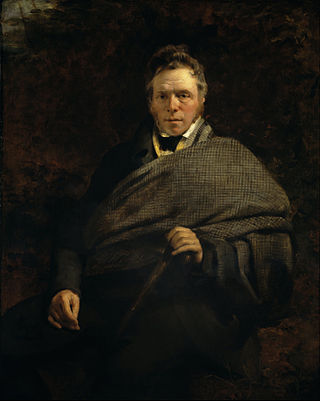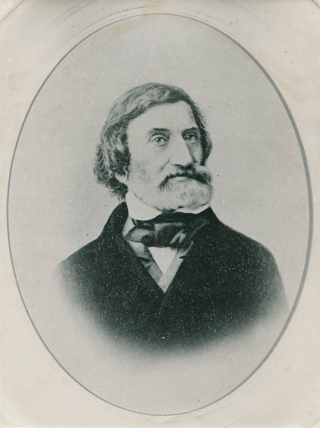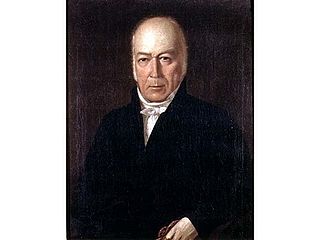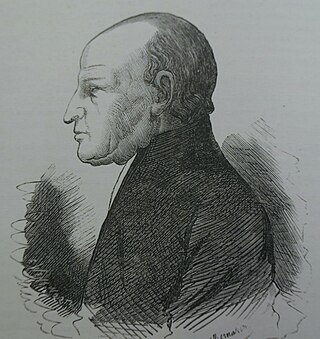Barron Field | |
|---|---|
| Born | 23 October 1786 |
| Died | 11 April 1846 |
| Occupation | Judge, writer |
Barron Field (23 October 1786 – 11 April 1846) was an English-born Australian judge and poet. [1]
Barron Field | |
|---|---|
| Born | 23 October 1786 |
| Died | 11 April 1846 |
| Occupation | Judge, writer |
Barron Field (23 October 1786 – 11 April 1846) was an English-born Australian judge and poet. [1]
Field was the second son of Henry Field, a London surgeon and apothecary, and Esther, née Barron. [1] Barron Field was educated as a barrister, being called to the Inner Temple on 25 June 1814. [2] In 1811 he published an analysis for students of Blackstone's Commentaries (with a second edition in 1817). [3] He was a great student of poetry and frequently contributed to the press, being for a time theatrical critic for The Times . He became acquainted with Charles Lamb and his circle; Crabb Robinson called on Field in January 1812 and found Lamb and Leigh Hunt there, and he records in another place that at Lamb's house on 23 May 1815 he met William Wordsworth, Field, and Thomas Noon Talfourd.
In 1816 Field accepted a commission as judge of the Supreme Court of Civil Judicature of NSW, and arrived in Sydney on 24 February 1817. Governor Macquarie, writing to Under-secretary Goulburn in April thanked him "for making me acquainted with Mr Field's character. He appears to be everything that you say of him and I am very much prejudiced in his favour already from his mild modest and conciliating manners, and I am persuaded he will prove a great acquisition and blessing to this colony". Field was soon at work framing the necessary "Rules of Practice and Regulations for conducting the Proceedings of the Court". His salary was £800 a year with a residence, government servants, and rations for himself.
In 1819 he published First Fruits of Australian Poetry, the first volume of verse, although it had only twelve pages, issued in Australia. Lamb reviewed it in the Examiner for 16 January 1820. An enlarged edition appeared in 1823. [4] Though Field carried out his duties ably and conscientiously he does not appear to have been able to keep himself clear from the petty squabbles and jealousies of a small settlement. An echo of this may be found in the description of Field by John Dunmore Lang as a "weak silly man who fancied himself a poet born". Sir Thomas Brisbane, writing to Earl Bathurst in January 1824, stated that Field "had embraced every opportunity of falsely and foully slandering me and my government". But Brisbane could be irascible if he thought his honour or dignity was touched, and his first ground of complaint appears to have been that "during his first two years in the colony, Field had never once entered Government House". However, word was already on the way to Brisbane that Field had been recalled, and Lamb, writing at the end of 1824, mentions that "Barron Field is come home from Sydney. He is plump and friendly; his wife really is a very superior woman". Field had been granted a pension of £400 a year from 4 February 1824.
Field was the editor of Geographical Memoirs on New South Wales (1825) [5] which, among other things, introduced new species of plants, such as Boronia anemonifolia A.Cunn . [6] The abbreviation B.Field is used when citing Field in botanical literature. [7]
Field accepted the position of advocate-fiscal in Ceylon in December 1828. He was soon afterward appointed judge of the Court of Civil Pleas at Gibraltar. Disraeli called on him there in 1830 and gave an unflattering description of him in a letter to his sister. Field had a disagreement with the Gibraltar Governor, Sir William Houston over the handling of a case involving a Spanish smuggler ship, the Guerrera. In 1836 Crabb Robinson spoke of intending to visit him at Gibraltar, and in 1841 Field printed another small volume of verse, Spanish Sketches, at the press of the garrison library there. In 1844 he was back in England writing to Crabb Robinson from Torquay. He died on 11 April 1846, survived by his wife (who died in 1878), there were no children.
Field's claim to distinction does not rest entirely on the fact that he wrote the first volume of verse to appear in Australia, he also founded the first savings bank in June 1819. He is spoken of with respect in Miss Marion Phillips's A Colonial Autocracy. He was the B.F. of one of the most famous of Lamb's essays and the recipient of more than one of his delightful letters, which suggests that he must have had likeable qualities. His verse has little value, but he could do better work in prose and had some claims to be an Elizabethan scholar, his special interest being Thomas Heywood. His Geographical Memoirs on New South Wales, published in 1825, is an interesting collection of some of the earliest scientific papers relating to Australia.

James Henry Leigh Hunt, best known as Leigh Hunt, was an English critic, essayist and poet.

James Hogg was a Scottish poet, novelist and essayist who wrote in both Scots and English. As a young man he worked as a shepherd and farmhand, and was largely self-educated through reading. He was a friend of many of the great writers of his day, including Sir Walter Scott, of whom he later wrote an unauthorised biography. He became widely known as the "Ettrick Shepherd", a nickname under which some of his works were published, and the character name he was given in the widely read series Noctes Ambrosianae, published in Blackwood's Magazine. He is best known today for his novel The Private Memoirs and Confessions of a Justified Sinner. His other works include the long poem The Queen's Wake (1813), his collection of songs Jacobite Relics (1819), and his two novels The Three Perils of Man (1822), and The Three Perils of Woman (1823).

Robert Tannahill was a Scottish poet of labouring class origin. Known as the 'Weaver Poet', he wrote poetry in English and lyrics in Scots in the wake of Robert Burns.

Walter Savage Landor was an English writer, poet, and activist. His best known works were the prose Imaginary Conversations, and the poem "Rose Aylmer," but the critical acclaim he received from contemporary poets and reviewers was not matched by public popularity. As remarkable as his work was, it was equalled by his rumbustious character and lively temperament. Both his writing and political activism, such as his support for Lajos Kossuth and Giuseppe Garibaldi, were imbued with his passion for liberal and republican causes. He befriended and influenced the next generation of literary reformers such as Charles Dickens and Robert Browning.

James Montgomery was a Scottish-born hymn writer, poet and editor, who eventually settled in Sheffield. He was raised in the Moravian Church and theologically trained there, so that his writings often reflect concern for humanitarian causes, such as the abolition of slavery and the exploitation of child chimney sweeps.

Ebenezer Elliott was an English poet, known as the Corn Law rhymer for his leading the fight to repeal the Corn Laws, which were causing hardship and starvation among the poor. Though a factory owner himself, his single-minded devotion to the welfare of the labouring classes won him a sympathetic reputation long after his poetry ceased to be read.
William Stewart Rose (1775–1843) was a British poet, translator and Member of Parliament, who held Government offices. From a Tory background, he was well-connected in the political and literary world, and made a mark by his championing of Italian poets and a burlesque style of verse based on their influence as satirists.

Carl Ludwig Christian Rümker was a German astronomer.

James Burney was an English rear-admiral, who accompanied Captain Cook on his last two voyages. He later wrote two books on naval voyages and a third on the game of whist.
Nationality words link to articles with information on the nation's poetry or literature.

Laurence Hynes Halloran was a poet, unordained clergyman and felon who became a pioneer schoolteacher, journalist, and bigamist in Australia, founder of the Sydney Public Free Grammar School.

James Brunton Stephens was a Scottish-born Australian poet, and author of Convict Once.
The Supreme Court of Civil Judicature of New South Wales was a court established in the early 19th century in the colony of New South Wales. The colony was subsequently to become a state of Australia in 1901. The court had jurisdiction to deal with civil disputes where the amount in dispute in the colony was more than £50 sterling. The Supreme Court of New South Wales replaced the court in 1823 when the Supreme Court was created by the Third Charter of Justice.

Michael Massey Robinson was a poet and author of the first published verse in Australia.

Charles Lloyd II was an English poet who was a friend of Charles Lamb, Samuel Taylor Coleridge, Robert Southey, William Wordsworth, Dorothy Wordsworth and Thomas de Quincey. His best-known poem is "Desultory Thoughts in London".

George Gordon Byron, 6th Baron Byron, was an English poet and peer. He is one of the major figures of the Romantic movement, and is regarded as being among the greatest of English poets. Among his best-known works are the lengthy narratives Don Juan and Childe Harold's Pilgrimage; much of his shorter lyrics in Hebrew Melodies also became popular.

Percy Bysshe Shelley was a British writer who is considered as one of the major English Romantic poets. A radical in his poetry as well as in his political and social views, Shelley did not achieve fame during his lifetime, but recognition of his achievements in poetry grew steadily following his death, and he became an important influence on subsequent generations of poets, including Robert Browning, Algernon Charles Swinburne, Thomas Hardy, and W. B. Yeats. American literary critic Harold Bloom describes him as "a superb craftsman, a lyric poet without rival, and surely one of the most advanced sceptical intellects ever to write a poem."
Elizabeth Ogilvy Benger was an English biographer, novelist and poet. Some of her poetry had a strong social message.

Peter Bell: A Tale in Verse is a long narrative poem by William Wordsworth, written in 1798, but not published until 1819.

Cyanothamnus anemonifolius, commonly known as narrow-leaved boronia or sticky boronia, is a flowering plant that is endemic to south-eastern Australia. It is a shrub with mostly pinnate leaves, with white to pale pink four-petalled flowers in leaf axils.